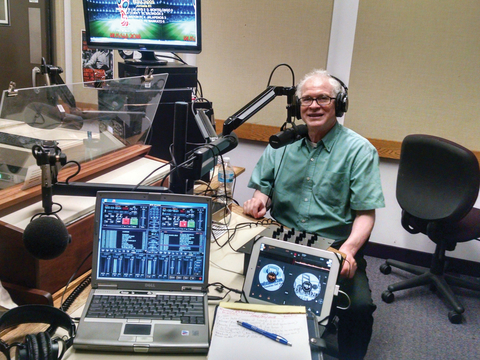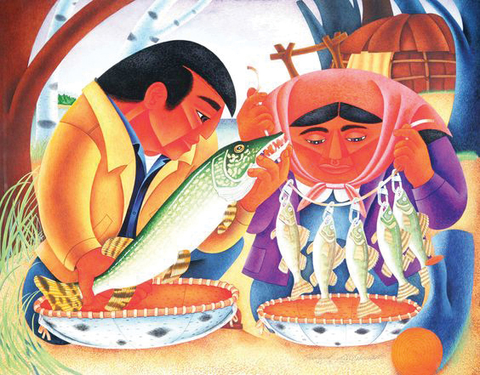Speaking the same language for individuals, families and business owners
Everyone is facing new challenges right now, but those challenges can be even greater for people of color. In the U.S., Latino and Black people have been three times as likely as white people to become infected with COVID-19.
Critical updates on public safety, food and financial assistance programs, and health care resources are often only available in English.
Now for some good news: Antonio Alba Meraz has been helping to fill in the gaps for Minnesota’s Latino audiences. An educator with Extension’s Latino Financial Literacy Program, Alba Meraz takes to the airwaves every Saturday on KMSU, a public radio station based at Minnesota State University, Mankato. The station reaches the large Spanish-speaking population in southern Minnesota and northern Iowa, along with web listeners far and wide.
For the first hour of “Dos Por Uno,” a Spanish music program, Alba Meraz shares financial literacy tips, as well as information on COVID-19 from official sources.
“I expected to be there just for the first hour, but the radio staff asked me to stay for the next program and I ended up being there for four hours,” says Alba Meraz. “It was so important to share this information with the community, because for many people, it was not accessible.”
Reaching people where they are
Over the years, Alba Meraz has built strong partnerships with the Consulate of Mexico in St. Paul and local nonprofits like Neighborhood House, a St. Paul agency that provides free education, youth programs and assistance with basic needs.
Currently, Alba Meraz is working to determine the best way to deliver financial workshops to immigrant families during a time of social distancing. Some new immigrants may not have access to computers or internet service, or might be unfamiliar with remote learning.
For Alba Meraz, resiliency means being able to return to “normal” after being exposed to a stressful situation. Despite the challenges of life before, during and after the pandemic, it’s a skill he is trying to nurture with every family he serves.
Loss of business income affects home life, too
Like most business owners, Paula VanBaalen recently had a sudden change of plans. As the owner and operator of Ohana Therapeutic Massage in downtown Hibbing, she was serving more than 50 clients per week and planning to launch a new massage therapy school.
The future looked bright—and then along came COVID-19. Within a few weeks, VanBaalen had to close her business indefinitely and delay the launch of her massage school. With this loss of income, she would need to make changes at home.
Capitalizing on a wealth of knowledge
VanBaalen heard about Extension’s personal finance resources from Lori Hendrickson, an Extension educator in family financial resiliency who is an accredited financial counselor.
Hendrickson says it’s the quality of information that makes Extension stand out. “Our research-based materials are about everything from adjusting to income loss, to credit and debt, to spending, saving and retirement,” she says. “There are articles, workshops, checklists and videos.”
“A lot of people don’t realize how much personal finances are related to business finances, but it’s the same concept,” says VanBaalen.
Extension also offers webinars for businesses trying to maintain businesses through a pandemic.
VanBaalen continued to make smart and strategic financial decisions at home as she reopened her business with safe practices in early June. “There’s so much financial information out there, it gets really overwhelming,” says VanBaalen. “The way Extension breaks it down into small, manageable pieces is something that can help a lot of people right now.”
Holiday gift-giving tips during the pandemic
Lori Hendrickson, Extension financial resiliency educator, offers some ideas for navigating what is likely to be a less traditional holiday season this year.
- Create a spending plan. Determine what to buy and start early to find deals on those items. Include all costs, including decorations, food and shipping.
- Make the best of your stay-at-home time. Consider using extra time at home to make cards or gifts. You could even make a family video to share via email, versus spending money on cards.
- Give family-friendly gifts. Gifts like movie baskets with snacks, gift cards for streaming services, or ingredients for a family dinner will be welcome gifts this year. Family gifts, rather than individual gifts, also help limit spending.
- Stay out of debt. Make sure to have money available to pay bills in full. Overspending will only set us up for financial worries next year.
Find resources for adjusting to income loss, including videos on topics like determining wants and needs and creating a spending plan.
Ojibwe storytelling conveys lessons in money management
"Booshke Giin" (It’s up to you, it’s your decision!) is a creative approach to involve American Indian youth in active learning experiences that make financial education concepts relevant to their everyday decision making.
Jennifer Garbow and Becky Hagen Jokela, Extension educators in family resiliency, prepared the Booshke Giin lessons with storytelling to teach core financial concepts. They consulted with Joyce Serido, Extension specialist and professor, for an approach that is adaptable for other youth audiences.
The lessons are based on Ojibwe and other tribal legend stories, to reinforce financial concepts and incorporate Ojibwe vocabulary and culture. The legends are followed by questions that guide reflection.
Find the Booshke Giin curriculum online.




